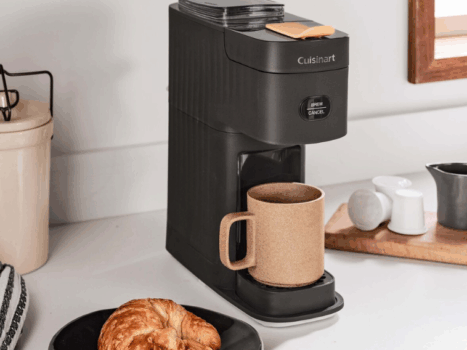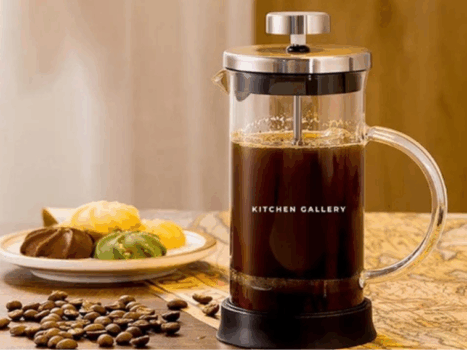What Is a Coffee Maker?
A coffee maker is a machine designed to brew coffee easily and consistently. Instead of manually boiling water and mixing coffee powder, a coffee maker automates the entire process. You simply add water, coffee grounds, or a coffee pod, and the machine extracts the flavor from the coffee to give you a fresh cup in minutes. It’s one of the most commonly used kitchen appliances in homes, cafés, and offices because it saves time and ensures the taste remains the same every day.
Contents
How Does a Coffee Maker Work?
A coffee maker uses a simple process:
- Water Reservoir – You fill the machine with cold water.
- Heating Element – The machine heats the water to the ideal brewing temperature.
- Filter Basket – Coffee grounds are placed in a filter so water can pass through them.
- Brewing – Hot water drips through the coffee grounds, absorbing flavor and aroma.
- Fresh Coffee Output – The brewed coffee flows into a pot, cup, or mug ready to drink.
Pros and Cons of Using a Coffee Maker
Pros
1. Easy and Convenient
A coffee maker makes brewing coffee extremely simple. You just add water and coffee grounds, press a button, and the machine handles everything. This is perfect for busy mornings or workplaces where people don’t have time to prepare coffee manually.
2. Consistent Taste Every Time
Because the machine uses the same amount of water and heat each time, the flavor stays consistent. Unlike manual brewing—where taste can change every time—coffee makers deliver steady, reliable results.
3. Saves Time
Most coffee makers brew coffee within minutes. This makes them ideal for anyone with a tight schedule. Drip machines can also make multiple cups at once, saving even more time.
4. Cost-Effective Compared to Buying Outside
Using a coffee maker at home is much cheaper than purchasing coffee from cafés daily. You save money in the long term while still enjoying fresh, flavorful coffee.
5. Keeps Coffee Warm
Many machines come with warming plates or thermal carafes that keep the coffee hot for hours. This is helpful for offices or large families who drink coffee throughout the day.
Cons
1. Requires Regular Cleaning
Coffee makers need frequent cleaning—especially the filter basket, pot, and water reservoir. If not cleaned properly, they can develop buildup that affects flavor and hygiene.
2. Some Machines Are Expensive
High-end espresso machines or advanced models can be costly. They offer great features, but not everyone needs a premium machine.
3. Pods Can Be Costly (For Single-Serve Machines)
If you use a pod-based machine like Nespresso or Keurig, the pods can get expensive over time. They’re convenient, but the cost per cup is higher than ground coffee.
4. Takes Up Counter Space
Coffee makers—especially drip machines and espresso machines—can occupy a noticeable amount of space in the kitchen. This may be a problem for small kitchens.
5. Limited Customization (In Basic Models)
Simple coffee makers don’t offer the level of control that manual brewing methods do. You can’t adjust water temperature, pressure, or brewing time the way advanced coffee lovers might want.
Benefits of Brewing Fresh Coffee at Home
Brewing fresh coffee at home offers a blend of comfort, savings, and superior taste that store-bought or instant options can’t match. One of the biggest advantages is freshness—when you make coffee at home using fresh beans or grounds, the flavor is richer, smoother, and more aromatic. You control the strength, roast, and brewing style, allowing you to create a cup that perfectly suits your taste.
Another major benefit is cost-effectiveness. A single café coffee can be expensive, and buying it daily adds up quickly. Brewing at home costs only a fraction of the price, helping you save money while still enjoying high-quality coffee. It also saves time, especially on busy mornings, because you can prepare your drink in minutes without waiting in long lines.
Brewing at home also gives you complete control over ingredients. You decide how much sugar, milk, flavor, or cream goes in, making it a healthier option compared to store-bought drinks that may contain extra calories or artificial additives.
Why a Coffee Maker Has Become Essential for Homes and Offices
A coffee maker has become an essential appliance today because it brings convenience, comfort, and consistency to everyday life. In homes, people rely on their morning coffee to start the day with energy. Having a coffee maker means you can enjoy fresh, flavorful coffee anytime without depending on instant mixes or expensive café visits. It saves time, money, and effort—especially for families where multiple people drink coffee daily. The machine ensures everyone gets their perfect cup quickly and without mess.
In offices, the importance is even greater. A coffee maker keeps employees refreshed, focused, and productive throughout the day. Workplaces often run on tight schedules, and stepping out to buy coffee repeatedly is impractical. With a coffee maker available, staff can grab a fresh cup in minutes, helping reduce fatigue and increase efficiency. It also creates a positive office environment where team members can take a small break, reset their mind, and boost their mood.
Whether at home or at work, a coffee maker delivers speed, simplicity, and reliable taste—making it a must-have appliance for modern lifestyles.
5 Types of Coffee Makers
Here are 5 types of coffee makers:
1. Drip Coffee Maker
A drip coffee maker is the most common machine found in homes and offices. You add water and coffee grounds, and the machine drips hot water through a filter to brew multiple cups at once. It’s perfect for families or workplaces because it’s fast, simple, and consistent.

2. Espresso Machine
This machine makes strong, concentrated coffee known as espresso. It forces hot water through finely ground coffee under high pressure. Espresso machines are ideal for latte, cappuccino, and Americano lovers. They offer café-style coffee at home but require a bit more skill and maintenance.

3. Single-Serve Pod Coffee Maker
These machines use coffee pods or capsules (like Nespresso or Keurig) to make one cup at a time. They are very convenient—just insert a pod, press a button, and your coffee is ready in seconds. Great for people who want quick brewing without mess.

4. French Press
A manual coffee maker that uses hot water and coffee grounds soaked together. After a few minutes, you press down the plunger to separate the grounds. The French press is known for producing bold, rich, and full-flavored coffee.

5. Cold Brew Coffee Maker
Designed to brew coffee slowly using cold water over 12–24 hours. This machine creates smooth, low-acid, refreshing cold coffee. It’s perfect for summer or for those who prefer lighter, less acidic coffee.






